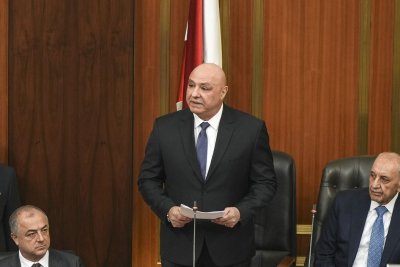
May 2 (UPI) — Lebanon‘s Higher Defence Council on Friday warned the Palestinian Islamic Resistance Movement, Hamas, against launching attacks or firing rockets into Israel from Lebanese territory, stating that strict measures will be taken to end any actions that violate the country’s sovereignty.
The warning by the country’s top military body came after the Lebanese Army arrested a number of Lebanese and Palestinians suspected of firing rockets into northern Israel on March 22 and March 28. The rocket attacks provoked additional Israeli retaliatory strikes.
While no group claimed responsibility for the rocket firing and Hezbollah denied any link, security reports indicated that three Hamas members were among those detained by the Army.
Major General Mohamad al Mustafa, the Secretary-General of the Higher Defense Council, said after a meeting attended by President Joseph Aoun and Prime Minister Nawaf Salam that Hamas was “warned against using Lebanese territories to carry out any action that harms Lebanon’s national security.”
“Maximum necessary measures will be taken to put a definitive end to any action that violates Lebanese sovereignty,” al Mustafa said, reading a statement.
He said that legal proceedings will commence early next week against all those detained and anyone who would be proven involved with last month’s rocket attacks will be prosecuted.
Aoun said during the meeting any attempt to “destabilize” the country, “involve it in wars” or “expose it to danger” will not be tolerated.
Salam emphasized the need for handing over “all illegal weapons” and preventing Hamas or any other factions to “destabilize security and national stability.”
Both leaders, who came to power last January, have remained firm on their pledges to disarm all militias and impose the state monopoly on weapons.
Hamas has carried out several attacks from southern Lebanon against Israel during the Gaza war that broke out in October 2023. Israel on its part killed a number of Hamas leaders based in Lebanon, including the deputy head of the group’s political bureau, Saleh al Arouri.
Lebanon has been trying to consolidate its authority and regain its long-lost sovereignty following Israel’s recent war that greatly weakened the once-powerful Iran-backed Hezbollah.
Mainly, 85% of Hezbollah’s positions and military facilities south of the Litani River in south Lebanon already are being taken by the Lebanese Army and its weapons confiscated in line with the Nov. 27 cease-fire agreement that was brokered by the United States and France to end the war with Israel.
The Army has also begun gradually taking control of some Palestinian positions outside the country’s 12 overcrowded refugee camps located in various regions.
Palestinian President Mahmoud Abbas is scheduled to visit Beirut on May 21 for talks with his Lebanese counterpart to discuss a mechanism for disarming Palestinian factions inside the camps and expanding Lebanon’s authority.